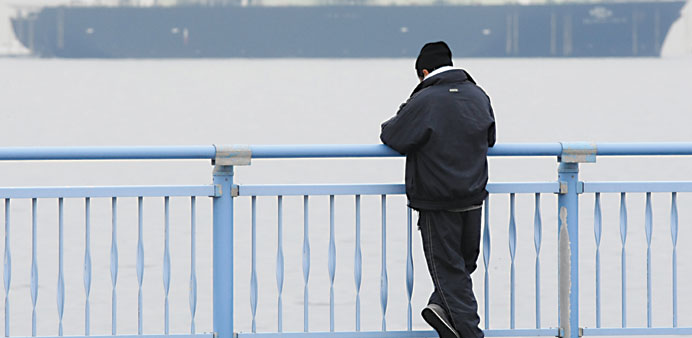A man looking at an LNG tanker sailing across the Tokyo Bay in Sodegaura City, Chiba Prefecture (file). Japan, once the world’s third-biggest nuclear power producer, probably won’t start any of 52 reactors still halted since the March 2011 earthquake as new safety rules take effect and will have to burn LNG for power generation, Wood Mackenzie Ltd said.
Bloomberg/Doha/Singapore
Liquefied natural gas prices in Asia are poised to reverse an eight-week drop that brought them to a two-year low relative to cargoes for Europe as Japan faces delays in starting nuclear reactors.
LNG for northeast Asia has fallen 22% from a record in February, cutting its premium to shipments for southwest Europe to as little as $1.40 a million British thermal units, data from World Gas Intelligence show. Asian prices may soar about $5 to more than $20 per million Btu by September, according to Sabine Schels, an analyst at Bank of America Corp in London.
The current Asian premium isn’t high enough to attract LNG cargoes from Nigeria and Trinidad, the biggest suppliers of spot shipments behind Qatar, away from Europe, according to data from Poten & Partners Inc, a New York-based consultant.
Japan, once the world’s third-biggest nuclear power producer, probably won’t start any of 52 reactors still halted since the March 2011 earthquake as new safety rules take effect and will have to burn LNG for power generation, according to Wood Mackenzie Ltd
“I’d expect to see an Asian premium of at least $3 per million Btu as you need that to lure Atlantic cargoes into the East, with a widening of that differential in summer and winter,” said Tony Regan, an energy consultant with Tri-Zen International in Singapore, which counts Royal Dutch Shell and Lukoil as clients. “Supply will be tight this year and so expect to see greater price volatility in Asia.”
LNG for delivery in four to eight weeks in northeast Asia cost $15.15 a million Btu on April 8, the least since November and down from a record $19.40 on February 4, data from New York- based WGI show. That compares with $12.90 in southwest Europe, where colder-than-usual weather has kept prices near the January 28 level of $14.70, the highest in at least two years.
It cost $1.94 a million Btu more to ship Nigerian LNG to South Korea than to Spain in February with a comparable figure for Trinidadian LNG of $2.75, Poten & Partners data show. Nigeria and Trinidad together supplied 23.9% of spot cargoes last year, the International Group of Liquefied Natural Gas Importers, or GIIGNL, said in its annual report last month.
Japan, the world’s biggest LNG buyer, shut nuclear generators after the 2011 tsunami and earthquake caused a meltdown at the Fukushima Dai-Ichi plant. New safety rules that go into effect in July may require years of reinforcement work for some reactors, requiring LNG imports for power generation.
The Asian country imported a record 87.3mn metric tonnes of LNG in 2012, according to Ministry of Finance data. Japanese demand will be 89mn tonnes in 2020 assuming nuclear restarts and 94mn tons without, Akira Miyamoto, an Osaka Gas Co executive researcher, said last month in Amsterdam.
“The tightness in the market is likely to persist,” said Schels, who forecasts US gas will rise to $4.30 per million Btu in the fourth quarter, the second-highest among 20 analyst projections made in the past six months, according to data compiled by Bloomberg. “We will see the market rebound again. Demand from Asia is staying very strong.”
Asian LNG prices surged to a record this year as utilities faced with colder-than-usual weather competed for shipments with South American buyers hit by a drought. The bidding war increased costs for importers from Petroleo Brasileiro to Tokyo Electric Power Co.
Qatar ran liquefaction plants at full capacity to meet demand, Minister of Energy and Industry HE Dr Mohamed bin Saleh al-Sada said on March 5 in Doha.
UK’s next-month gas, the European benchmark, rose to a four-year high of 76.15 pence a therm on March 26 on the ICE Futures Europe exchange in London amid colder-than-usual weather. That is equivalent to $11.65 a million Btu. The contract traded at 67.9 pence yesterday.
“I can’t see Europe coming up significantly unless there is still snow on the ground in the UK in June,” Regan said.
Japan may start half a dozen reactors by the end of this year in addition to the two that resumed operations in 2012, Areva chief executive officer Luc Oursel said March 4. That would reduce demand for LNG in power generation.
Spot LNG prices will fall as low as $12 by the third quarter amid “much-anticipated Japanese nuclear restarts,” Rob Smith, a Dubai-based consultant at FACTS Global Energy, said in a February 13 e-mail.
Japan, China and South Korea, which together buy more than half of the world’s LNG, use inventories to meet heating demand during the peak winter season and typically seek spot cargoes in April, May and June to top up stocks before summer, when air conditioning use drives demand. A quarter of LNG was sold on a spot or short-term basis last year, GIIGNL said in its report, with the rest sold under long-term contracts tied to oil prices.

